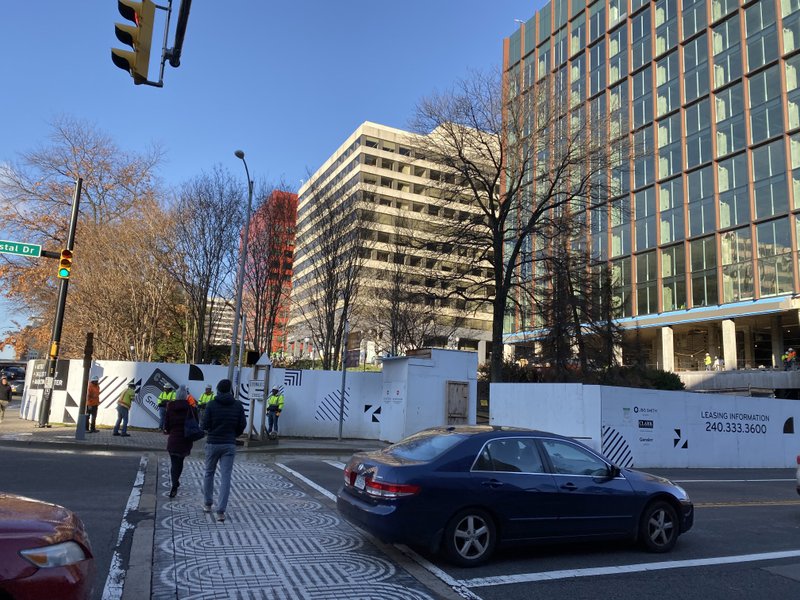A union is alleging that employers at six construction projects that will house Amazon employees or operations in northern Virginia have evaded federal and state taxes by misclassifying workers, failing to carry workers' compensation coverage and avoiding overtime pay.
In a 24-page report based on its own investigation, the Eastern Atlantic States Regional Council of Carpenters alleges multiple violations of federal labor law by general contractors, subcontractors and labor brokers who supply workers for projects owned and managed by four development companies and intended for Amazon.
(Amazon founder and chief executive Jeff Bezos owns The Washington Post.)
Drywall carpenters working on buildings in Arlington, Springfield, Manassas and Sterling are routinely misclassified as independent contractors, the union said, despite their daily work being directed and controlled -- and their tools provided -- by the subcontractors. Classifying someone as an independent contractor allows employers to avoid paying payroll taxes, workers' compensation and overtime.
If true, the allegations would raise the profile of the issue of labor law violations in Virginia, a right-to-work state, just as Amazon is seeking approval before the Arlington County Board for building its own headquarters on property it has purchased in the Pentagon City neighborhood.
The board is scheduled to vote on that proposal Saturday.
JBG Smith Properties, which owns three of the six properties that the union cites, said in a statement Thursday that it cannot respond to specific claims since it has not seen the union's report.
"That said, when JBG Smith is made aware of these types of claims, it works closely with its general contracting partners to ensure they are rectified," the statement said.
Owners of the other locations could not be reached for comment.
Three of the structures under renovation are temporary quarters for Amazon headquarters employees in Arlington until their permanent headquarters is built. A warehouse in Springfield and data centers in Manassas and Sterling are also cited.
Amazon said it became aware of the union's report in the past month and decided as a result to apply the rules it has pledged to uphold for the properties it will build in Arlington to its leased headquarters properties in the county as well.
Those rules include requiring all workers to be paid prevailing wages, no independent contractors employed without the property owners' approval, and being subject to oversight by a third-party labor administration team.
"We take these issues very seriously and want to be sure ... it's a positive project and we offer competitive wage rates," said Holly Sullivan, Amazon's director of worldwide economic development.
While property owners and contractors are immediately responsible for labor practices on a site, a company that will lease the space may also wield tremendous clout if it chooses to do so, said Virginia Diamond, president of the Northern Virginia AFL-CIO.
"We warned them this would happen if they didn't instruct JBG Smith and others to avoid business as usual," Diamond said, adding that she was "befuddled" as to why Amazon didn't initially insist on adherence to the labor rules.
"We want Amazon to be the good neighbor it said it wanted to be."
The report says that in addition to violating the law and taking advantage of a largely immigrant labor force, the projects' misclassification of workers "allows these employers to fraudulently cut labor costs ... [and provides] a considerable unfair competitive advantage."
Some of the labor broker companies named in the report are accused of issuing checks to workers and instructing the workers not to deposit the checks, but instead to cash them at various locations, including at rental apartments, where a broker deducted a fee for cashing the check he wrote.
Another labor broker appeared at the job site, the report says, and paid the carpenters in cash with pay stubs but no actual paycheck.
Jhoswill Construction and Crystal Homes Services, two of the four labor brokers listed, did not immediately respond to requests for comment. Jose Escobar, with Castro E. Construction, said: "We try to do everything legal. They have to have their certificate of insurance and pay their own taxes." He also said Castro no longer is working on the building the union cited in its report.
A man who refused to identify himself at Brothers RC Contractors LLC said the carpenters' union's allegations are untrue but would not answer further questions. But the union arranged for The Washington Post to interview a carpenter who told a different story.
"The first time I got a check, [the broker] said don't go to a bank ... he'd text me an address where I was supposed to bring my check. It was at a house, late at night," said the carpenter, who did not want his name used because he feared loss of his job. "He paid me with cash and out of that cash money, he took some away, $12 to $15 at first. He took a bigger fee every time."
Nancy Modesitt, a University of Baltimore professor who specializes in employment law, said worker misclassification is rampant in the construction industry nationwide, and "epidemic" in places like Virginia, where she said there is virtually no enforcement of labor law abuses.
States lose untold dollars in tax revenue because income taxes and worker compensation taxes are not being paid, Modesitt said, and the federal government is losing payments for Social Security, Medicare, unemployment and income taxes.
John Schoettler, vice president of Amazon's global real estate and facilities, told the Arlington Planning Commission last week that for the headquarters it is building, the company will require its general contractor and subcontractors to pay all nonsalaried workers the regional prevailing wages and benefits as a minimum standard. Independent contractors will not be allowed unless approved by Amazon.
Business on 12/13/2019
